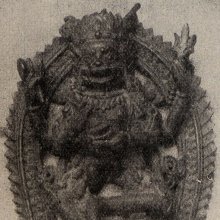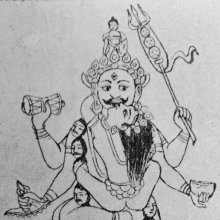Mahodadhi, Mahodadhī, Mahant-odadhi, Maha-udadhi: 21 definitions
Introduction:
Mahodadhi means something in Buddhism, Pali, Hinduism, Sanskrit, Marathi, Hindi. If you want to know the exact meaning, history, etymology or English translation of this term then check out the descriptions on this page. Add your comment or reference to a book if you want to contribute to this summary article.
Images (photo gallery)
In Hinduism
Natyashastra (theatrics and dramaturgy)
Source: Wisdom Library: Nāṭya-śāstraMahodadhi (महोदधि) is a Sanskrit word referring to the “ocean”. Acording to the Nāṭyaśāstra 1.82-88, when Brahmā, Indra and all other gods went to inspect the playhouse (nāṭyamaṇḍapa) designed by Viśvakarmā, he assigned different deities for the protection of the playhouse itself, as well as for the objects relating to dramatic performance (prayoga).
As such, Brahmā assigned Mahodadhi to the floor (surface of the earth, mahīpṛṣṭha). The protection of the playhouse was enacted because of the jealous Vighnas (malevolent spirits), who began to create terror for the actors.

Natyashastra (नाट्यशास्त्र, nāṭyaśāstra) refers to both the ancient Indian tradition (shastra) of performing arts, (natya—theatrics, drama, dance, music), as well as the name of a Sanskrit work dealing with these subjects. It also teaches the rules for composing Dramatic plays (nataka), construction and performance of Theater, and Poetic works (kavya).
Ayurveda (science of life)
Rasashastra (Alchemy and Herbo-Mineral preparations)
Source: Wisdom Library: Rasa-śāstraMahodadhi (महोदधि) or Mahodadhirasa is the name of an Ayurvedic recipe defined in the fourth volume of the Rasajalanidhi (chapter 4, ajīrṇa: indigestion). These remedies are classified as Iatrochemistry and form part of the ancient Indian science known as Rasaśāstra (medical alchemy). However, since it is an ayurveda treatment it should be taken with caution and in accordance with rules laid down in the texts.
Accordingly, when using such recipes (e.g., mahodadhi-rasa): “the minerals (uparasa), poisons (viṣa), and other drugs (except herbs), referred to as ingredients of medicines, are to be duly purified and incinerated, as the case may be, in accordance with the processes laid out in the texts.” (see introduction to Iatro chemical medicines)

Āyurveda (आयुर्वेद, ayurveda) is a branch of Indian science dealing with medicine, herbalism, taxology, anatomy, surgery, alchemy and related topics. Traditional practice of Āyurveda in ancient India dates back to at least the first millenium BC. Literature is commonly written in Sanskrit using various poetic metres.
Shaktism (Shakta philosophy)
Source: Google Books: ManthanabhairavatantramMahodadhi (महोदधि) refers to the “great ocean”, according to the Manthānabhairavatantra, a vast sprawling work that belongs to a corpus of Tantric texts concerned with the worship of the goddess Kubjikā.—Accordingly, “[...] Liberation [i.e., mokṣa] is the plane beyond (the differentiated) energies (kalātīta-pada). One should contemplate it constantly at the end of power (śaktyanta, that is, the Transmental). (The reality) beyond being (bhāvātīta) is incomparable. It is the great ocean [i.e., mahodadhi] within the End of the Twelve. It is taught to be the Western Tradition, the House that is said to be the City of the Moon (Candrapura). [...]”.

Shakta (शाक्त, śākta) or Shaktism (śāktism) represents a tradition of Hinduism where the Goddess (Devi) is revered and worshipped. Shakta literature includes a range of scriptures, including various Agamas and Tantras, although its roots may be traced back to the Vedas.
Jyotisha (astronomy and astrology)
Source: Wisdom Library: Brihat Samhita by VarahamihiraMahodadhi (महोदधि) refers to the “ocean”, according to the Bṛhatsaṃhitā (chapter 12), an encyclopedic Sanskrit work written by Varāhamihira mainly focusing on the science of ancient Indian astronomy astronomy (Jyotiṣa).—Accordingly, “The mighty ocean whose waters were swallowed by Agastya, exhibited gems that eclipsed the splendour of the crowns of the Devas [...] It exhibited whales, water elephants, rivers and gems scattered over its bed [i.e., mahodadhi], and, though deprived of water, presented an appearance splendid as Devaloka. There were also seen, moving to and fro, whales, pearl oysters and conch shells, and the sea altogether looked like a summer lake with its moving waves, water lilies and swans”.

Jyotisha (ज्योतिष, jyotiṣa or jyotish) refers to ‘astronomy’ or “Vedic astrology” and represents the fifth of the six Vedangas (additional sciences to be studied along with the Vedas). Jyotisha concerns itself with the study and prediction of the movements of celestial bodies, in order to calculate the auspicious time for rituals and ceremonies.
Shaivism (Shaiva philosophy)
Source: SOAS University of London: Protective Rites in the Netra TantraMahodadhi (महोदधि) refers to the “great ocean”, according to the Svacchanda-tantra.—Accordingly, [verse 7.220cd-222]—“[The Yogin] should visualize a second lotus above him in the great ocean (mahodadhi) with the power of amṛta as well as a lotus with its full moon mouth pointed downward. In the middle of that, he should visualize haṃsa joined with the bindu and topknot. He should visualize a divine rain of amṛta, falling everywhere and imagine [it to] enter [his body] in the opening above himself [i.e., the path through the center of the body through which the Ātman rises to śakti-tattva]”.

Shaiva (शैव, śaiva) or Shaivism (śaivism) represents a tradition of Hinduism worshiping Shiva as the supreme being. Closely related to Shaktism, Shaiva literature includes a range of scriptures, including Tantras, while the root of this tradition may be traced back to the ancient Vedas.
In Buddhism
Tibetan Buddhism (Vajrayana or tantric Buddhism)
Source: archive.org: The Indian Buddhist IconographyMahodadhī (महोदधी) is one of the twenty-four Goddesses surrounding Buddhakapāla in the buddhakapālamaṇḍala, according to the 5th-century Sādhanamālā (a collection of sādhana texts that contain detailed instructions for rituals).—Buddhakapāla refers to one of the various emanations of Akṣobhya and the sādhana says that when Heruka is embraced by Citrasenā he gets the name of Buddhakapāla.—Mahodadhī stands in the north-west of the middle circle. She has a blue colour two arms, one face, ornaments of bones, brown hair rising upwards but no garlands of heads. She carries the kapāla in the left and the kartri in the right, and dances in the ardhaparyaṅka attitude.

Tibetan Buddhism includes schools such as Nyingma, Kadampa, Kagyu and Gelug. Their primary canon of literature is divided in two broad categories: The Kangyur, which consists of Buddha’s words, and the Tengyur, which includes commentaries from various sources. Esotericism and tantra techniques (vajrayāna) are collected indepently.
Languages of India and abroad
Pali-English dictionary
Source: BuddhaSasana: Concise Pali-English Dictionarymahodadhi : (m.) the ocean.
Source: Sutta: The Pali Text Society's Pali-English DictionaryMahodadhi refers to: the (great) ocean, the sea Sn. 720, 1134; Miln. 224; Mhvs 18, 8.
Note: mahodadhi is a Pali compound consisting of the words mahant and odadhi.

Pali is the language of the Tipiṭaka, which is the sacred canon of Theravāda Buddhism and contains much of the Buddha’s speech. Closeley related to Sanskrit, both languages are used interchangeably between religions.
Marathi-English dictionary
Source: DDSA: The Molesworth Marathi and English Dictionarymahōdadhi (महोदधि).—m S The great sea,--the ocean south-ward of Ceylon.
Marathi is an Indo-European language having over 70 million native speakers people in (predominantly) Maharashtra India. Marathi, like many other Indo-Aryan languages, evolved from early forms of Prakrit, which itself is a subset of Sanskrit, one of the most ancient languages of the world.
Sanskrit dictionary
Source: DDSA: The practical Sanskrit-English dictionaryMahodadhi (महोदधि).—
1) the great ocean; महोदधेः पूर इवेन्दु- दर्शनात् (mahodadheḥ pūra ivendu- darśanāt) R.3.17.
2) an epithet of Indra. °जः (jaḥ) a conchshell, shell.
Derivable forms: mahodadhiḥ (महोदधिः).
Mahodadhi is a Sanskrit compound consisting of the terms mahā and udadhi (उदधि).
Source: Cologne Digital Sanskrit Dictionaries: Edgerton Buddhist Hybrid Sanskrit DictionaryMahodadhi (महोदधि).—name of a nāga: (Ārya-)Mañjuśrīmūlakalpa 454.15.
Source: Cologne Digital Sanskrit Dictionaries: Shabda-Sagara Sanskrit-English DictionaryMahodadhi (महोदधि).—m.
(-dhiḥ) 1. The ocean. 2. Indra. E. mahā great, udadhi the sea.
Source: Cologne Digital Sanskrit Dictionaries: Benfey Sanskrit-English DictionaryMahodadhi (महोदधि).—m. the great ocean.
Mahodadhi is a Sanskrit compound consisting of the terms mahā and udadhi (उदधि).
Source: Cologne Digital Sanskrit Dictionaries: Cappeller Sanskrit-English DictionaryMahodadhi (महोदधि).—[masculine] sea, ocean.
Source: Cologne Digital Sanskrit Dictionaries: Aufrecht Catalogus CatalogorumMahodadhi (महोदधि) as mentioned in Aufrecht’s Catalogus Catalogorum:—poet. [Sūktikarṇāmṛta by Śrīdharadāsa]
Source: Cologne Digital Sanskrit Dictionaries: Monier-Williams Sanskrit-English Dictionary1) Mahodadhi (महोदधि):—[from mahā > mah] m. the gr° ocean, a gr° sea (4 in number), [Mahābhārata; Kāvya literature] etc.
2) [v.s. ...] Name of a poet, [Catalogue(s)]
Source: Cologne Digital Sanskrit Dictionaries: Yates Sanskrit-English DictionaryMahodadhi (महोदधि):—[maho+dadhi] (dhiḥ) 2. m. Ocean; India.
Source: DDSA: Paia-sadda-mahannavo; a comprehensive Prakrit Hindi dictionary (S)Mahodadhi (महोदधि) in the Sanskrit language is related to the Prakrit word: Mahoahi.
[Sanskrit to German]
Sanskrit, also spelled संस्कृतम् (saṃskṛtam), is an ancient language of India commonly seen as the grandmother of the Indo-European language family (even English!). Closely allied with Prakrit and Pali, Sanskrit is more exhaustive in both grammar and terms and has the most extensive collection of literature in the world, greatly surpassing its sister-languages Greek and Latin.
Hindi dictionary
Source: DDSA: A practical Hindi-English dictionaryMahodadhi (महोदधि):—(nm) an ocean.
...
See also (Relevant definitions)
Partial matches: Mahant, Maha, Udadhi, Otati.
Starts with: Mahodadhi mishra, Mahodadhija, Mahodadhirasa, Mahodadhitati.
Ends with: Ayurmahodadhi, Ayurvedamahodadhi, Brahmavidyamahodadhi, Dharmamritamahodadhi, Ganaratnamahodadhi, Ganatattvamahodadhi, Janardanamahodadhi, Kathamahodadhi, Mantramahodadhi, Namamahodadhi, Nyayamahodadhi, Shivarcanamahodadhi, Shraddharatnamahodadhi, Smritiratnamahodadhi, Sutamahodadhi, Vaidyamahodadhi, Vrittamahodadhi.
Full-text (+223): Makotaticottam, Mahodadhija, Caphattaka, Gavishthila, Vaishayya, Puka, Jalebha, Khalvaka, Gulugula, Gavishthilayana, Vaishastya, Vaidyamahodadhi, Bhaluta, Caphattakya, Matrayam, Shakatangaja, Vikli, Vishasti, Gaumathika, Nyayamahodadhi.
Relevant text
Search found 13 books and stories containing Mahodadhi, Mahodadhī, Mahant-odadhi, Maha-udadhi, Mahōdadhi, Mahā-udadhi; (plurals include: Mahodadhis, Mahodadhīs, odadhis, udadhis, Mahōdadhis). You can also click to the full overview containing English textual excerpts. Below are direct links for the most relevant articles:
Garga Samhita (English) (by Danavir Goswami)
Verse 3.2.22 < [Chapter 2 - The Great Festival of Śrī Girirāja]
Rasa Jala Nidhi, vol 4: Iatrochemistry (by Bhudeb Mookerjee)
Part 29 - Treatment for indigestion (27): Mahodadhi rasa < [Chapter IV - Irregularity of the digesting heat]
Rasa Jala Nidhi, vol 5: Treatment of various afflictions (by Bhudeb Mookerjee)
Part 9 - Chemists of the Metallic School: Kapali, author of Rasa-raja-mahodadhi < [A Brief History of Indian Chemistry and Medicine]
The Indian Buddhist Iconography (by Benoytosh Bhattachacharyya)
Manusmriti with the Commentary of Medhatithi (by Ganganatha Jha)
Verse 9.314 < [Section XLI - The Treatment of Brāhmaṇas]
Brihad Bhagavatamrita (commentary) (by Śrī Śrīmad Bhaktivedānta Nārāyana Gosvāmī Mahārāja)
Verse 1.4.39 < [Chapter 4 - Bhakta (the devotee)]
Verse 2.4.173 < [Chapter 4 - Vaikuṇṭha (the spiritual world)]

